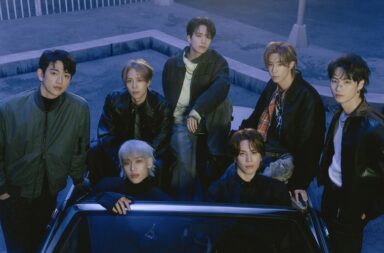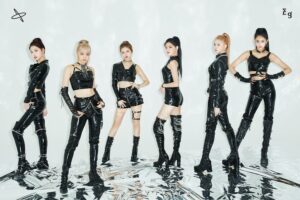
Before the release of this mini album, “Everglow” and “synthwave” were not two words that the average Kpop fan would associate with one another. However, –77.82 x -78.29 — possibly a pair of co-ordinates which point directly to Antarctica, and which will from hereon simply be referred to as “the mini album”— sees Everglow moving away from their trademark hard-hitting EDM sound of their title tracks and venturing into new areas, while also revisiting certain others.
Title track “La Di Da” and “Untouchable” are both pure, sleek synthwave, while “Gxxd Boy” is more of a hip-hop track, which brings back some of the “edge” of the group’s previous songs. “No Good Reason”, meanwhile, is reminiscent of the girls’ 2019 b-side “Hush”, with its relatively more stripped-down style and almost delicate electronic instrumental.
The album begins with the title track “La Di Da”— and what a title track it is. Everglow have taken a step away from the brash EDM that was becoming their trademark to plant their feet firmly in the 80’s inspired synthwave trend which has taken off in the West over the course of the last year, with artists such as Dua Lipa and The Weeknd both releasing similarly nostalgic synth-heavy albums. “La Di Da”’s glittering instrumental evokes The Weeknd’s “Blinding Lights” in particular.
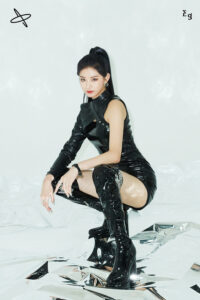
One of the song’s greatest strengths is its chorus hook: a jubilant, nostalgic melody evoking early-2000s pop music. However, the chorus’ first lyric “Got no time for haters” does feel, for lack of a better word, slightly cringy. References to “haters” in songs have generally always put me off, and the bridge’s mention of “players” also does the song no favours.
However, the song’s strengths lie in its bombastic production and catchy chorus hook, and its weaker lyrics don’t inherently detract from the song’s overall enjoyment value. The fact that they are easy to sing and straight to the point could also be said to add to the song’s overall sense of elation, just as good pop music should.
One of the biggest criticisms Everglow has faced have had to do with their vastly unequal line distribution, with “Dun Dun” — their most recent release— in particular being criticised for making the group seem more like Mia feat. Everglow. Fortunately, “La Di Da,” and the mini album overall, has allowed for other members to shine more and more.
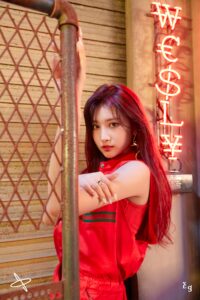
Sihyeon’s vocal prowess is given a chance to shine on each of the song’s choruses, while Aisha being relocated from two-line raps in “Dun Dun” to a beautiful singing verse (among other parts) in “La Di Da” is one of the song’s biggest highlights— as is her and Onda’s command of the pre-chorus.
Despite all of these wonderful vocal moments, the bridge’s dance break still stands out as one of the song’s most euphoric, pedal-to-the-metal moments, as the already dazzling synth-filled instrumental overflows into a gorgeously textured synth loop. Personally, I feel that the song could do with a similar outro just to truly bring its energy to a peak, but, as it is, “La Di Da” packs a sufficient amount of punch, and is a standout amongst both Everglow’s discography and recent K-pop releases.
“Untouchable” is “La Di Da”’s slightly more subdued younger sibling. Both songs are backed by vibrant, glittering 80’s synths, but if “La Di Da” was made for high-speed, triumphant nighttime racing down the highway in the middle of the night, “Untouchable” is the perfect song for a more laid-back, less heart-racing, albeit still joyful midnight cruise.
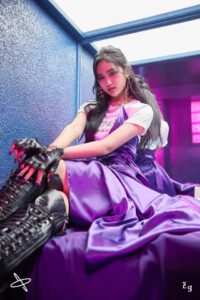
“Untouchable”’s lyrics also touch upon the notion of having no time for haters: “Whatever people say, we’re untouchable”. However, unlike “La Di Da”, “Untouchable” sees Everglow describing the power of a soulmate-like relationship which will last forever, as opposed to the self confidence-focused lyrics of the former.
To me, “Untouchable” doesn’t say much musically that “La Di Da” hasn’t already said, but does demonstrate that “La Di Da” wasn’t a one-off, and that synthwave is a genre Everglow is continuing to explore, and is well-suited for. It is worth saying that, to me, “Untouchable” doesn’t feel as “Everglow” as “La Di Da” does — the stamp of their identity doesn’t seem as entrenched in it as it is in “La Di Da”. While this is understandable as this mini is their first foray into the genre, hopefully the group will continue to be cautious and retain their distinctiveness if they choose to continue pursuing this trendy genre.
In “Gxxd Boy”, Everglow continue to be explorative, and more modern musical influences return. Everglow have made a few forays into hip-hop in both their title tracks and b-sides alike. However, they tend to litter trap and/or hip-hop elements throughout their songs rather than focusing on the genre for a full song, often preferring to replace trap breakdowns with snarling EDM drops: their b-side “Player”, from 2019’s “Reminisce”, is just one example.

“Gxxd Boy” is definitely one of their most straightforward hip-hop tracks to date, and is strength lies in the fact that it allows Everglow to show their versatility once again, as almost all of the members get a chance to showcase their rapping throughout the song. Aside from this, the song also differs from the first two tracks in almost every way possible. The hip hop/trap influenced instrumental immediately contrasts with the synthwave songs, and reaches its climax during the sung prechorus, before dropping out into the chorus: a relatively quiet affair when compared with the powerful, pulsing EDM “noise” choruses featured in some of Everglow’s previous tracks.
E:U and Yiren take command of the chorus in this case, with soft, whispery repetitions of “must be the good boy”, backed by only a repetitive percussive beat and “aaaah”s. The song’s overall structure, hip hop/rap focus and instrumental also make it seem like a distant relative to Bigbang G-Dragon and Taeyang’s 2014 hit “Good Boy”, making me wonder if “Gxxd Boy” was an intentional tribute to the song.
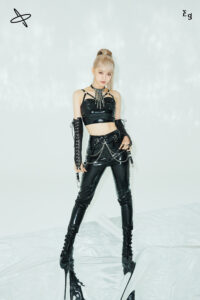
The mini album closes off with “No Good Reason”, which is to this album what the b-side “Hush” was to 2019’s mini of the same name: a pleasant, comforting song supported by a sparkling, soft electronic instrumental, and the album’s most vulnerable point, both lyrically and musically.
Past the hot summer
Going around the faded autumn, but I’m now
I can’t find
Some good reason, good reason to let you go
While “No Good Reason” doesn’t quite see Everglow letting down their guard as much as they did on “Hush”, nor does it possess the almost magical quality of the latter, it is still a pleasing end to the album, and is also its mellowest point. Although Everglow is no doubt perfectly suited for their girl crush concept, “Hush” indicated that they also manage to shine on gentler songs. “No Good Reason” is a sign that the group could be adapting this style of chill, pleasant electronic songs as the Everglow brand softer song— not only a decision which suits the group well, but one which also allows for a pleasant change from the ballad album closers present in many other groups’ albums.
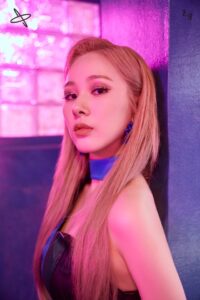
Overall, -77.82 x -78.29 is a step in an interesting new direction for Everglow, while also revisiting some of the areas they had previously shown to be strong in. While not necessarily revolutionary, the album is well-made and enjoyable. Although we of course have yet to hear the group’s next body of work, it seems like this mini-album was made for the group to test the waters for a musical concept change, and Everglow have certainly shown that they are versatile enough for it. For a group that I feel has not yet shown us everything they can do, “La Di Da” is a promising offering of things to come.
(YouTube. Lyric translation via Color Coded Lyrics. Images via Yuehua Entertainment.)



